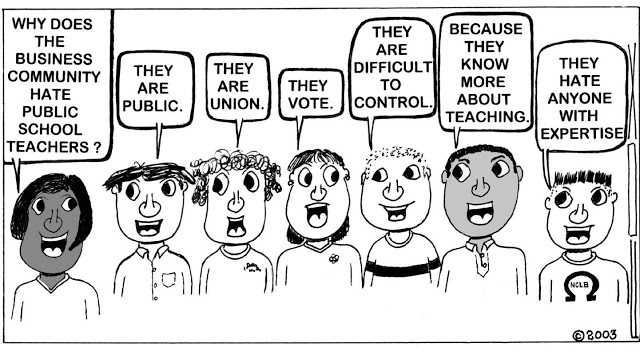A Harsh Look at Education?
Combing through the featured blog posts at the education section of the Huffington Post, one does get the feeling that there seems to be nothing out there that is good to hear or read about education:
- "If You Believe in Meritocracy, Fund State Universities" by Mark Yzaguirre with the title criticizes the the decrease in funding of state schools. Yzagurre starts by citing an interview of Harvard professor Todd Rose by the Boston Globe where Rose said, "We're supposed to be the country of [virologist] Jonas Salk, right? Jonas Salk's parents immigrated, and he went to the City College of New York, which doesn't charge tuition. We made that bet as a public: If you went to school on the taxpayers' dime, you could succeed. And then Jonas Salk cured polio, and he gave that cure away. The impact of that one innovation changed the world. So for me it's about, if our cure for cancer is probably a Latina sitting in a classroom in Oakland, how do we take advantage of this opportunity right now to reimagine the medium of public education, so that it doesn't come down to everyone fighting for smaller and smaller numbers of spots at Ivy League schools?"
- "After the Billionaires Kick Down Teachers and Students, Who Is Next?" by John Thompson talks about how reformers with the best intentions are actually harming the educational system. The problem as Thompson points out lies in a misplaced faith in numbers and market theories, believing that these tools can solve what is plaguing public school education.
- "Who Is to Blame?" by Randy Miller enumerates all the possible culprits behind a failing public school system and concludes that no one wants to admit guilt, but the reality is that there is no one to blame but the society when schools do not deliver.
The above are the first three featured blog posts on April 11, 2013. It does sound negative especially to someone who thinks that they have done all that could be done to help and save education. It does sound negative to someone who thinks that they have done what is best. It does sound negative to someone who does not really have a serious stake in public school education. One thing that the above three blog posts share in common is that these articles criticize an approach that has been generally applied. All three question policies. In fact, criticisms of education reforms are usually directed not at some pilot programs, but at approaches that are implemented at a much wider scale. The emphasis on these issues should not be surprising. These are the ones on which the general public must be properly well informed. Teachers do share good approaches among themselves and tidbits of success here and there. This is helpful among teachers. In fact, a lot of good education occurs when teachers talk with each other. Teachers then learn from each other. If engagement of a student is important for success inside a classroom, an engaged teacher is perhaps equally important. When a teacher finds something that works, it is useful to share this with others. However, when an approach seems promising and one then formulates it as a policy for everyone to follow, that makes the picture entirely different. Do not expect light criticisms. A good system should welcome well-founded comments even if these are mostly negative. Why? Simply because the risks are much higher and the price one pays for being wrong is simply enormous. Randy Turner sums it up nicely in a previous article, "A Warning to Young People: Don't Become a Teacher":
"...In the past, these are the teachers who stayed, earned tenure, and built the solid framework that has served their communities and our nation well. That framework is being torn down, oftentimes by politicians who would never dream of sending their own children to the kind of schools they are mandating for others...."That last phrase is very important. Politicians who are not sending their own children to the kind of schools that they control need to be criticized. It is the least bloggers could do.
 |
| Cartoon copied from Joanne Barkan's "Got Dough? Public School Reform in the Age of Venture Philanthropy" |
Comments
Post a Comment